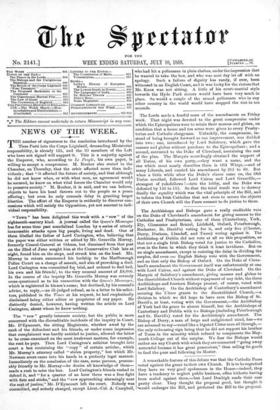The Archbishops and Bishops gave a really creditable vote on
the Duke of Cleveland's amendment for giving manses to the Catholics and Presbyterians, nine of them (Canterbury, York, Ely, Gloucester and Bristol, Lichfield, Oxford, Peterborough, Rochester, St. David's) voting for it, and only five (Chester, Derry, Durham, Llandaff, and Tuam) voting against it. The Archbishop of Dublin did not vote at all on this proposition, so that not a single Irish Bishop voted for justice to the Catholics, even in the form in which they think it least invidious. But on no single amendment, except in resisting the delay in dividing the surplus, did even one English Bishop vote with the Government, and on that only the Bishop of Oxford. On the Duke of Cleve- land's amendment the Government itself was unfortunately at one with Lord Cairns, and against the Duke of Cleveland. On the Marquis of Salisbury's amendment, giving manses and glebes to the disestablished Church without repayment of any debt, the three Archbishops and fourteen Bishops present, of course, voted with Lord Salisbury. On the Archbishop of Canterbury's amendment securing the Ulster grants to the disestablished Church,—a division in which we did hope to have seen the Bishop of St. David's, at least, voting with the Government,—the Archbishop of York had the grace to absent himself, but the Archbishops of Canterbury and Dublin with ten Bishops (including Peterborough and St. David's) voted for the Archbishop's amendment. The Bishop of Derry, a man of large and enlightened mind, has—we are ashamed to say—voted like a bigoted Ulster man all through,— the only redeeming sign being that he did not support his brother of Tuam in the minority which refused to compensate the May- nooth College out of the surplus. We fear the Bishops would rather see any Church with which they are connected "going away sorrowful because it has great possessions," than selling its goods to feed the poor and following its Master.






























